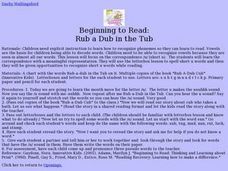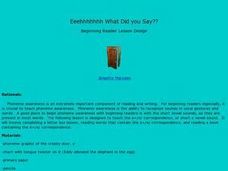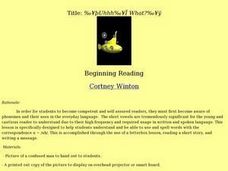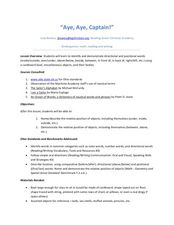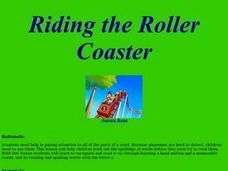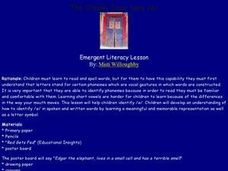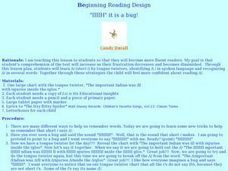Curated OER
Rub a Dub in the Tub
Students explore the short /u/ sound in this lesson. They use phonetic spelling to create words with the short /u/ sound using letter tiles. They then listen to the story "Rub-a-Dub Cub" and identify the short /u/ sound words they hear...
Curated OER
"Whaaa" Said The Baby"
Students recognize phonemes that correspond with the letters in the alphabet. They focus on identifying the short a, /a/ sound. They examine the way their mouths move when making the short a sound mimicking a baby's cry. In given...
Curated OER
Eeehhhhhhh What Did you Say??
Student read pseudo words containing the e=/e/ correspondence and recognize sounds in vocal gestures and words. They explore the e=/e/ correspondence, or short e vowel sound and complete a letter box lesson, reading words that contain...
Curated OER
Iggy and the Icky Sticky Inchworm
Students read and spell words. They have to recognize that letters stand for phonemes and spellings map out spoken words. Long and short vowels are hard to recognize and this lesson focuses on that. The short i is taught in the...
Curated OER
Uhhh..What?
Students identify and become competent and in reading the letter u, pronounced /uh/. They also use and spell words with the correspondance u = /uh/ by the use of a letterbox instructional activity, reading a short story, and writing a...
Curated OER
Silly Siggy
Young scholars recognize the short /i/ sound in spoken and written words in this lesson. They say a tongue twister which emphasizes words with the short /i/ sound. They then listen to the book "Liz is Six" and identify the words in the...
Curated OER
Fluency is Freedom!
Students read orally in groups of two to increase reading speed and fluency in this instructional activity. They read provided books which emphasize the short vowel sounds. The pairs time each others reading and offer encouragement and...
Curated OER
Grandpa Ed
Students engage in an emergent literacy lesson that focuses on phonemic awareness. For practice they become more comfortable with a short vowel phoneme, which can often be the most difficult to identify, by learning it in isolation.
Curated OER
The Icky Sticky Igloo
Students focus on the correspondence i=/i/. They explore the sound and spelling of /i/ and discover vowels are used to spell all words in our vocabulary, so therefore it is important for students to understand the phoneme and grapheme of...
Curated OER
Open Wide
Students recognize the short vowel o in written and spoken language. Through matching activities, students discriminate the short vowel o from the long vowel o. They associate the phoneme with its letter representation and identify the...
Curated OER
Doc Says Open Up
Students recognize the short /o/ sound in spoken words in this lesson. They say a tongue twister with words emphasizing the short /o/ sound. They then listen the the book "Hop on Pop" by Dr. Suess, and identify the words they hear...
Curated OER
Language Arts: Sound Recognition
First graders practice the short i sound by repeating tongue twisters. Later they write the letter i by using the analogy of drawing a straight line from the "fence" down to the "sidewalk" and putting a "basketball" above it. Other...
Curated OER
Icky Fingers
Students are introduced to digraphs so they can match letters to their phonemes. They recognize the short vowel i=/i/ in both spoken and written words by practicing reading and spelling words containing /i/. Elkonin Letter Boxes are...
Curated OER
"Ehhh" I can't hear you!
Students practice writing, sounding out, and identifying words using the short "e" sound. They listen as the teacher reads a tongue twister emphasizing short "e" beginning sounds. The stuents then participate in an activity in which...
Curated OER
Ellen the Elephant
Students build their sight vocabulary. They study the short vowel correspondence e. They practice pronouncing the /e/ phoneme when shown the grapheme e in written words. They read e = /e/ and write words that contain the e...
Curated OER
Jack the Fat Cat
Students recognize the short /a/ sound in written and spoken words in this lesson plan. They say a tongue twister which emphasizes words with the short /a/ sound. They then listen to the story "A Cat Nap" and identify the words in the...
Curated OER
Aye, Aye Captain
Students investigate how correspondences appear differently in different words. They also recognize the difference between long and short vowels. Students study how these correspondences are spelled and pronounced differently.
Curated OER
Say Ahh!!
Students identify the short /o/ sound in spoken words, and recognize the letter symbol /o/. They say a tongue twister emphasizing words with the short /o/ sound. They then listen to the story "In the Big Top" and identify the words...
Curated OER
E-E-E-E-Extra E-E-E-E-Effort
Students listen to a tongue twister emphasizing the short e sound. They practice writing the letter e and attaching different words with that sound to it. They listen to a book about a dog that enhances the letter e. They write a...
Curated OER
Let's Help the E Out!
Students explore the short /e/ sound. They practice making the sound, noticing how their mouths move to make the sound. They use letterboxes to spell and write 'e' words. They listen for the /e/ sound in a story and then write their own...
Curated OER
Riding the Roller Coaster
First graders recognize the short vowel a in written and spoken language. Through matching and listening activities, they discriminate the vowel sound /a/ from other phonemes. Students associate the phoneme with its letter representation...
Curated OER
The Creaky Door says /e/
Students explore the short /e/ sound, and identify the short /e/ in writing. Students read fun sentences from the board which emphasize the short /e/. They stretch out the /e/ sound every time they come to it while reading. They then...
Curated OER
"IIIIH" it is a bug!
Students practice the long and short vowel sounds of /i/ in a variety of text with assessing different strategies. They utilize tongue twisters to assist them including "The Itsy Bitsy Spider" and "Liz is Six." Letterboxes are also...
Curated OER
I Feel the Need....The Need for Speed!
Young scholars first learn to decode when learning to read. Decoding each letter and phoneme in a sentence or even a short text takes a considerable amount of time. Students must drill to progress in the pace and level of their reading....


